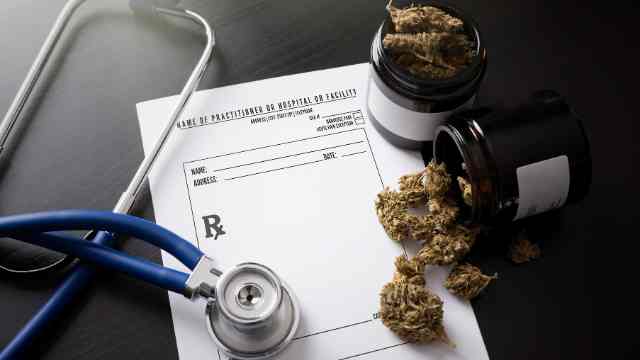
Medical marijuana has emerged as a valuable tool in the palliative care toolkit, offering relief from a range of symptoms that significantly impact the quality of life for patients with serious illnesses. This post will explore the role medical cannabis plays in palliative care in more detail.
What is Palliative Care?
Palliative care is a specialized medical care approach aimed at providing relief from the symptoms, pain, and stress of serious illness. Its main objective is to improve the quality of life for both the patient and their family. This type of care is appropriate at any stage of a severe sickness and can be provided alongside curative treatment.
Palliative care involves a multidisciplinary approach, with a team that typically includes nurses, doctors, and other licences medical specialists who work together with a patient's other healthcare providers to offer an extra layer of support. The focus is on managing symptoms such as pain, shortness of breath, constipation, fatigue, nausea, difficulty sleeping, loss of appetite, and depression.
How Does Medical Marijuana Help with Palliative Care?
Medical marijuana, also known as medical cannabis, has gained increasing attention and acceptance as an adjunct to palliative care. It has shown promise in managing a variety of symptoms that are common in palliative care patients, offering a potential option for those who have not found relief through traditional medications.

Here’s a more detailed look at how medical marijuana helps with palliative care:
- Pain Management: Chronic pain is a common issue among palliative care patients. Medical marijuana contains cannabinoids like THC (tetrahydrocannabinol) and CBD (cannabidiol) that interact with the body’s endocannabinoid system to modulate pain. Studies have shown that cannabis can reduce neuropathic pain.
- Nausea and Vomiting: The antiemetic properties of cannabinoids help in controlling the distressing symptoms of nausea and vomiting.
- Appetite Stimulation: Loss of appetite and weight loss are significant concerns in many palliative care patients. Medical marijuana is known to stimulate appetite, helping patients maintain their strength and nutritional status.
- Sleep Disorders: Many palliative care patients suffer from insomnia or other sleep disturbances. Medical marijuana, particularly strains high in CBD, has been found to help in improving sleep quality and duration.
- Anxiety and Depression: Medical marijuana has anxiolytic and antidepressant properties that can help in alleviating symptoms of anxiety and depression, providing emotional relief to patients.
- Muscle Spasms and Seizures: Conditions such as multiple sclerosis and epilepsy, which may be encountered in palliative care, can cause debilitating muscle spasms and seizures. CBD has been shown to reduce the frequency and severity of seizures and muscle spasms, improving patient comfort and mobility.

The Importance of Working with a Doctor When Using Medical Cannabis
While the potential benefits of medical marijuana in palliative care are substantial, it’s crucial for patients to work closely with a healthcare professional when considering its use. Here are several reasons why professional guidance is essential:
- Personalized Treatment Plans: Every patient’s condition and response to treatment are unique. A doctor can help tailor the use of medical marijuana to the specific needs of the patient, including selecting the appropriate strains, dosages, and methods of administration.
- Monitoring and Adjusting Treatment: Regular follow-up with a healthcare provider ensures that the treatment is effective and that any side effects are managed promptly. Adjustments to the treatment plan can be made based on the patient’s progress and changing needs.
- Avoiding Drug Interactions: Medical marijuana can interact with other medications. A doctor can help identify potential interactions and adjust medications as needed to avoid adverse effects.
- Legal and Safety Considerations: The legal status of medical marijuana varies by region, and there are specific regulations governing its use. A healthcare professional can guide patients through the legal landscape and ensure that they are using medical marijuana safely and legally.
- Education on Usage: Proper education on how to use medical marijuana is essential to avoid misuse and maximize benefits. Doctors can provide instructions on dosing, administration methods, and what to expect in terms of effects and side effects.

Why Obtain a Medical Marijuana Card in Hawaii?
Hawaii is one of the states in the U.S. that has recognized the therapeutic benefits of medical marijuana and has established a legal framework for its use. Obtaining a medical marijuana card in Hawaii offers several advantages for patients in palliative care:
- Legal Protection: A medical marijuana card provides legal protection to patients, allowing them to possess and use marijuana for medical purposes without facing legal penalties.
- Access to Dispensaries: With a medical marijuana card, patients can purchase cannabis products from state-licensed dispensaries. These dispensaries offer a range of products, ensuring that patients have access to high-quality and safe cannabis products.
- Quality and Safety: Products sold in licensed dispensaries are subject to stringent testing and quality control measures. This ensures that patients receive cannabis that is free from contaminants and accurately labeled in terms of potency and cannabinoid content.
- Variety of Products: Dispensaries offer a wide variety of cannabis products, allowing patients to find the form and strain that best suits their medical needs.
Bottom Line
As the acceptance and understanding of medical marijuana continue to grow, its role in palliative care is likely to expand, offering hope and improved quality of life to many patients and their families. The integration of medical marijuana into palliative care represents a significant advancement in the compassionate care of individuals facing serious health challenges.
However, the use of medical marijuana should always be conducted under the guidance of a healthcare professional to ensure safety, efficacy, and legal compliance. For patients in Hawaii, obtaining a medical marijuana card provides access to high-quality products, legal protection, and professional support, making it a beneficial step for those considering this treatment option.
If you’re seeking to obtain a medical cannabis card, reach out to the team at Malie Cannabis Clinic today!